Covid on campus: Partying, isolating - and sometimes both
- Published
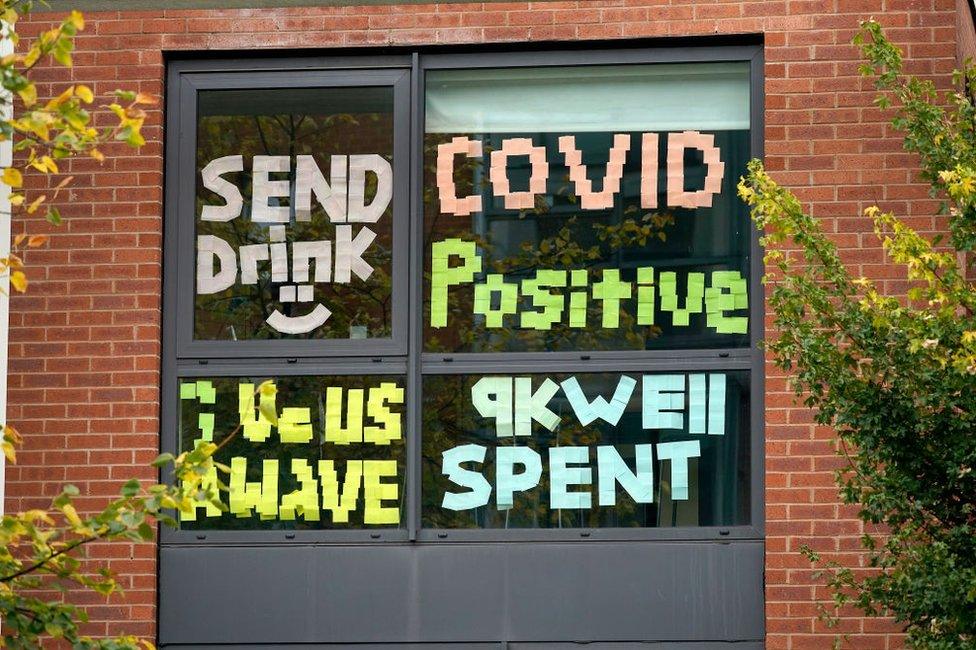
Messages from locked-down students at Manchester Metropolitan University
Anoushka Mutanda Dougherty was in the first year of her degree at Manchester University when the pandemic began and all students were sent home. Now she's back and has been finding out from friends and first-year students how the pandemic is affecting their social lives.
When coronavirus first stopped uni dead in its tracks back in March, I like most of my friends was expecting only a brief interlude to life as we knew it. I hadn't foreseen we'd be experiencing a second wave at the start of the next academic year - or that students arriving for the first time would be subjected to the horror that is virtual freshers.
With nightclubs shuttered for the foreseeable future, the rule of six and the 10pm closure of bars and restaurants, the possibility for socialising is pretty bleak and must be a particularly heavy blow to freshers, who would normally expect to be meeting hundreds of new people and doing some intense partying.
However, as I began to speak to people, I was surprised by the amount of optimism. It seemed that after months of lockdown, some students were grateful just to get out of their parents' house. And one way or another - responsibly or irresponsibly - lots of them were finding ways of socialising.
For many first-years it's been a really tough few months. Their years at school came to an abrupt halt. Most were put under huge stress when the algorithm gave them bad results. Now they are borrowing thousands of pounds to be at university and won't be getting anything like a normal university experience.

Anoushka (left) and her friend, Ria, in the pre-Covid era
Is it realistic to expect them to socialise only with the other people in the flats in their halls of residence? What if they don't immediately get on with them - do we want them to be miserable and lonely? This pandemic is really serious, but so is mental health.
I'm not sure how I would be coping in the first-years' shoes. I know after my parents dropped me off, I was disappointed that university didn't instantly live up to my expectations - and that was with all the normal freshers' week perks.
I don't know if it's the same for boys, but a lot of the bonding took place for the girls when we were all drunk in the bathroom toilets of a club, and we were all telling each other how much we love each other. It kind of broke down those walls, and I'm not sure how else you get over that hump of awkwardness.
Outside the hall where I lived last year, I met Sarah, a first-year who hasn't yet become close friends with her flatmates. The university hasn't explained how to meet coursemates, she told me. When she arrived she was given the key to her room, but there was no great announcement, she was just told to keep checking her emails.
"There haven't really been freshers' events," she says. "I think everyone's just a bit confused about why we're here for two weeks without anything to do."

SOCIAL DISTANCING: How have rules on meeting friends changed?
FACE MASKS: When do I need to wear one?
TESTING: How do I get a virus test?
LOOK-UP TOOL: How many cases in your area?

Helping to fill this vacuum are the friends she knew in London, where she went to school. And there have been parties in student halls. These were against government guidelines - with 20 or 25 people, sometimes more - but for her they were one of the few positive experiences she'd had since she arrived in Manchester.
I mentioned to Sarah that I'd heard about a lot of flat parties on the university's Fallowfield campus, and a mosh pit outside one of the houses. So why wasn't campus security shutting them down?
Sarah said that she had seen security staff.
"Like you kind of see them patrolling the area and stuff and they shut down the big ones [parties], but then people just migrate to another."
My friend Gabriel who I knew at school, but who took a gap year and has only just arrived, also thinks the university has been half-hearted about enforcing the rules, as if they didn't really expect people to follow them. It's true that people have been bombarded with emails about social distancing, and Gabriel says his name was taken at a party by some graduate students dressed in green uniforms - a sign that he may receive a warning - but otherwise it's been up to the students themselves to behave responsibly. And inevitably some haven't.
After meeting Eve, I came across Bo, a student from Wuhan in China, where the coronavirus pandemic began. He told me that students have gone back to university there, but they all have to have a test first. Once it's confirmed that they haven't got the virus, they can socialise freely.
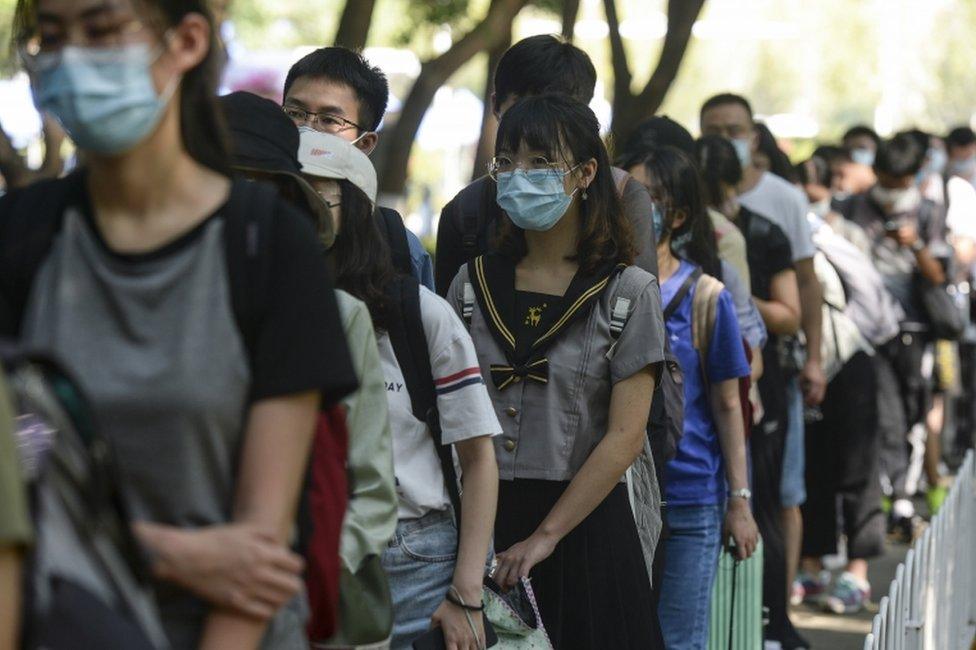
Students returning to study at university in Wuhan
Here, in some cases, it's almost like the opposite has been happening. People arrive at university, quickly find that they have been infected, and then socialise freely with others who are Covid-positive.
Dimitry is in a hall at Manchester Metropolitan university that has been locked down for two weeks, which means, he says, that "we can all socialise more - we don't really have to worry about the rule of six". He goes to parties where people discuss their test results and their symptoms (which are usually mild - maybe a headache or a slight cough, or loss of taste and smell).
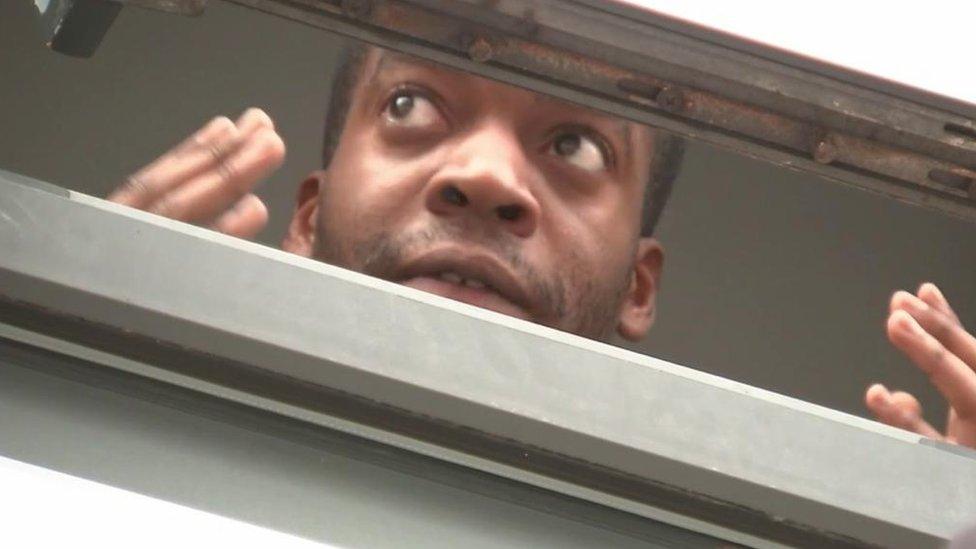
Dimitry in lockdown
"I don't think it would have been like that if they hadn't done the lockdown. But now everyone is locked down for two weeks anyway, so if you really wanted to avoid getting Corona, you would literally have to stay in your room - and even then people in your flat would probably still give it to you," he says.
"So there's an inevitability in terms of catching the virus and most people are just like, 'Are we that bothered?'"
I've heard about other parties held specifically for students who are Covid-positive. Ruby, who studies in Leeds, told me about one she was invited to at a house where people were "isolating", and you could only get in by showing a positive test result on your phone.
Ruby lives with her friends Amelia and Pav and a number of other students in a shared house. She says when two of them got positive test results the rest reluctantly agreed to isolate - and only after trips out to Nando's and a hairdresser's, and a mission to buy a pet fish.
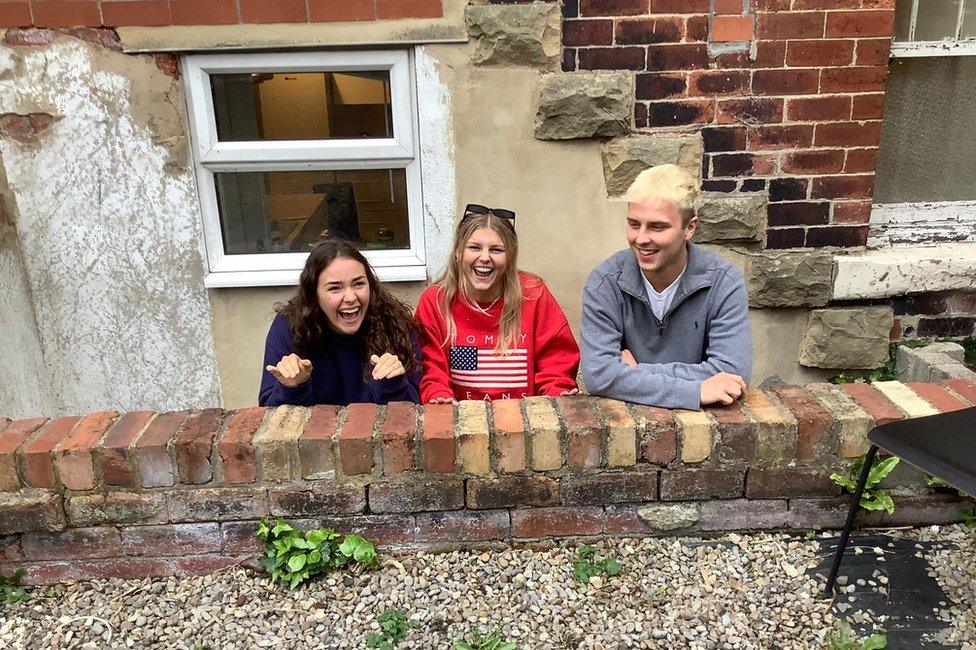
Amelia, Ruby and Pav preparing for seven days of fun in isolation
Now they are intending to make the best of it.
"We're planning seven days of fun," says Ruby. "We've ordered some clay today. We're having a week of activities planned, with themes for each room. We're going to have a party in each room in the house, just for the people in our house."
Amelia says that before their positive test results they weren't trying especially hard not to become infected, and that there was even a feeling that it would be better to get it now, when there was no risk of infecting their parents.
Some people might disagree with this attitude, I pointed out.
She replied that they had actually been pretty careful, only mixing with other students. They'd only made two socially distanced visits to the pub, and had worn masks on public transport.
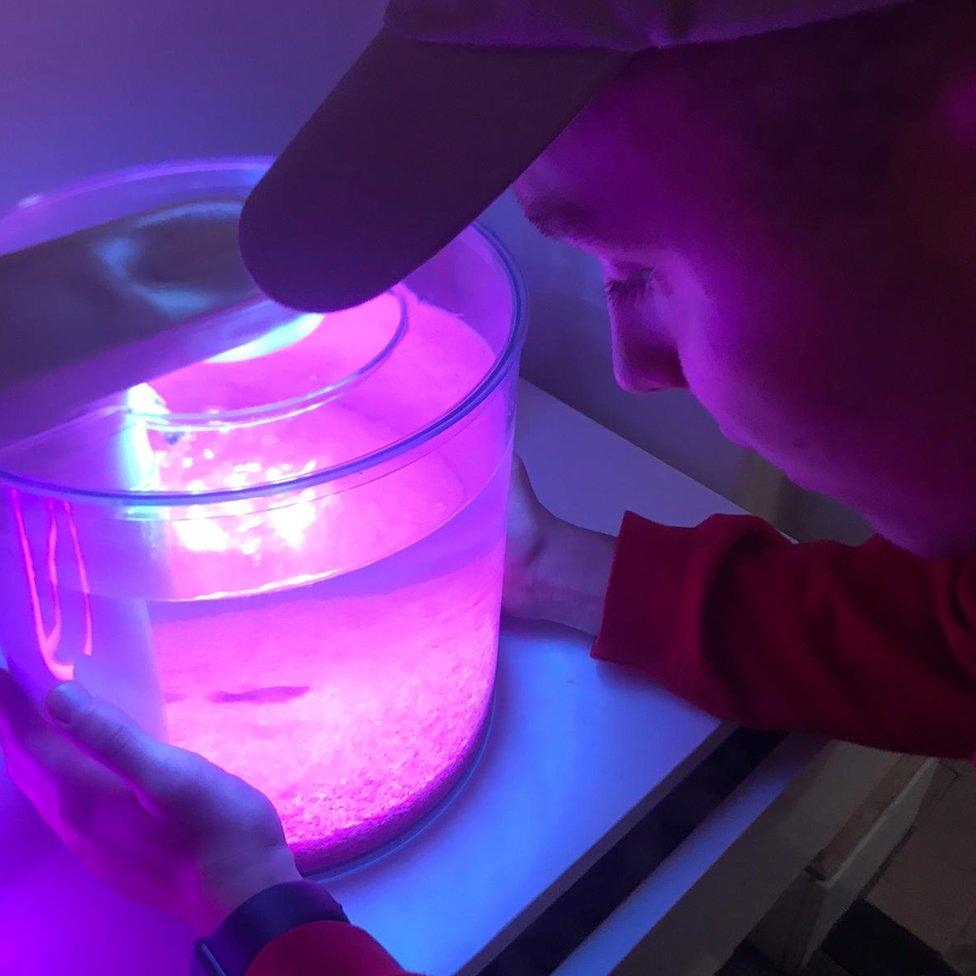
Last purchase before isolating - a goldfish
"I also think, now that we've had this scare, 'Oh my God, I went to the shop - and the man who works at the shop, I don't know where he lives and who he lives with,'" she says.
"So we are thinking about it, and now that we know, we're being really careful, just staying in."
Pav thinks it's easy to criticise students who have caught the virus.
"People are like, 'You shouldn't have been doing this. You shouldn't have been doing that.' But really everyone's been doing it, all students, because it's a social place, people are mixing whatever they might say. It's part of being at university to mix and meet up with others."
I have met people who have been socialising only with the people in their student flats and houses. My friend, Lily, has thrived in isolation after testing positive, racking up her Uber Eats bill and watching hours of Desperate Housewives in her room.
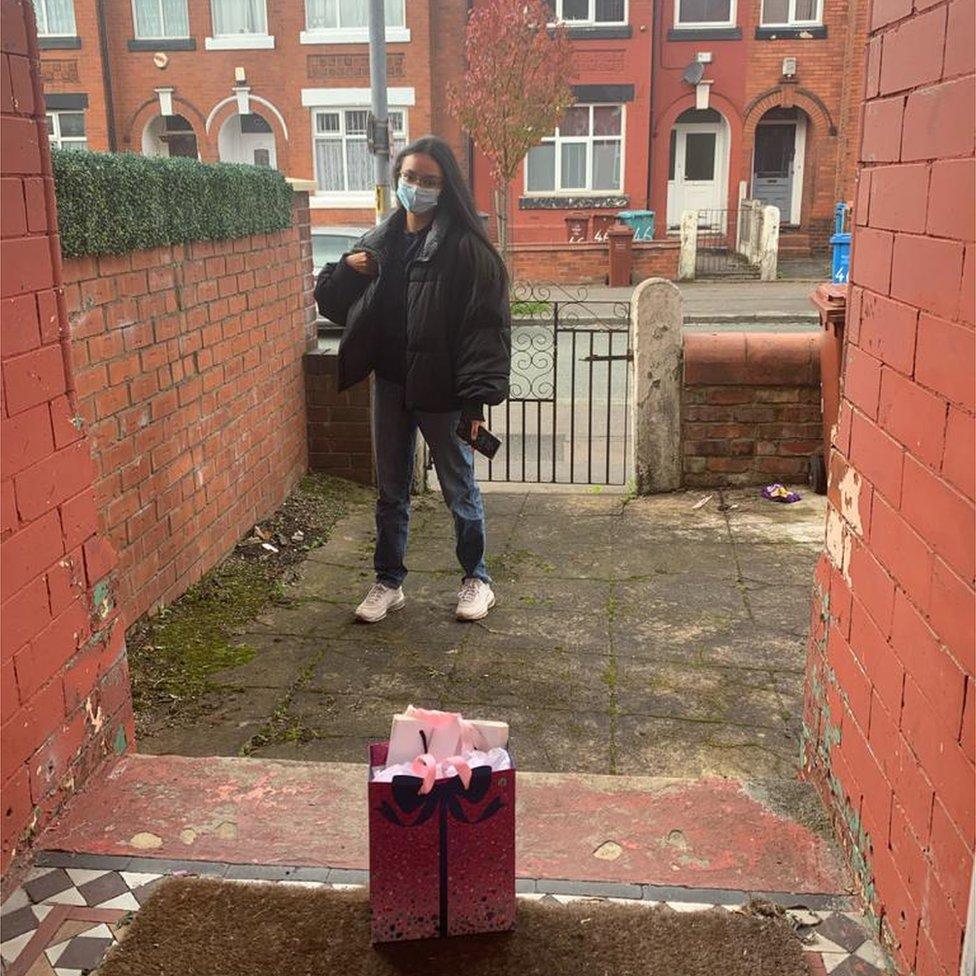
Lily, in isolation, collecting a birthday present
At the other end of the scale, there are undoubtedly students who have been recklessly breaking rules.
But bear in mind that academic fees are staying the same, despite everything, and that most students in enforced lockdown are still paying rent. Plenty of students think they were told to come back, instead of being instructed to stay at home and study online, because the university and the city needed their money. And some, like Gabriel, point out that the university hasn't done much apart from sending emails to show it's serious about enforcing the rules.
On top of that, little has been done to prevent some students feeling isolated, and mental health support is drastically below par.
Listen to Back to Uni on Monday 26 October at 20:00 on BBC Radio 4
Follow @Anoushka_md, external and radio producer@SueM1tchell, externalon Twitter
A University of Manchester spokesman said in a statement that the safety and well-being of students was the University's primary concern and that it would support them in every way it could.
"We have put in place a comprehensive support package for all students who are self-isolating, that includes a partnership with a major food retailer, delivery of parcels, support on well-being and practical matters such as laundry and prescription medicine. This has been communicated to all of our students," the statement said.
"We realise that the current restrictions on socialising are difficult for our new students in particular so we have worked with our Students' Union to put in place a welcome programme with a large number and variety of events. Where possible these are face-to-face, but our courses and numerous clubs and societies have also developed online options.
"As a University we are doing all we can to keep our students, staff and the wider Manchester community safe."
You may also be interested in:
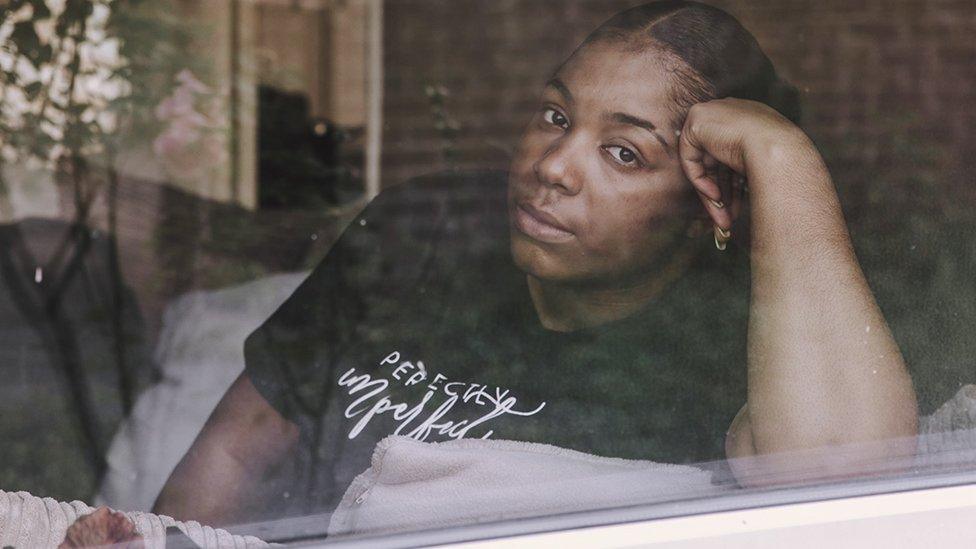
If you've been following the stories of people who have contracted coronavirus and are experiencing debilitating symptoms that won't go away, Jade Gray-Christie's story may sound familiar. Because her symptoms were considered "mild", she was not hospitalised, but her life has been turned upside down since falling ill in March.
Long Covid: 'My fatigue was like nothing I've experienced before'